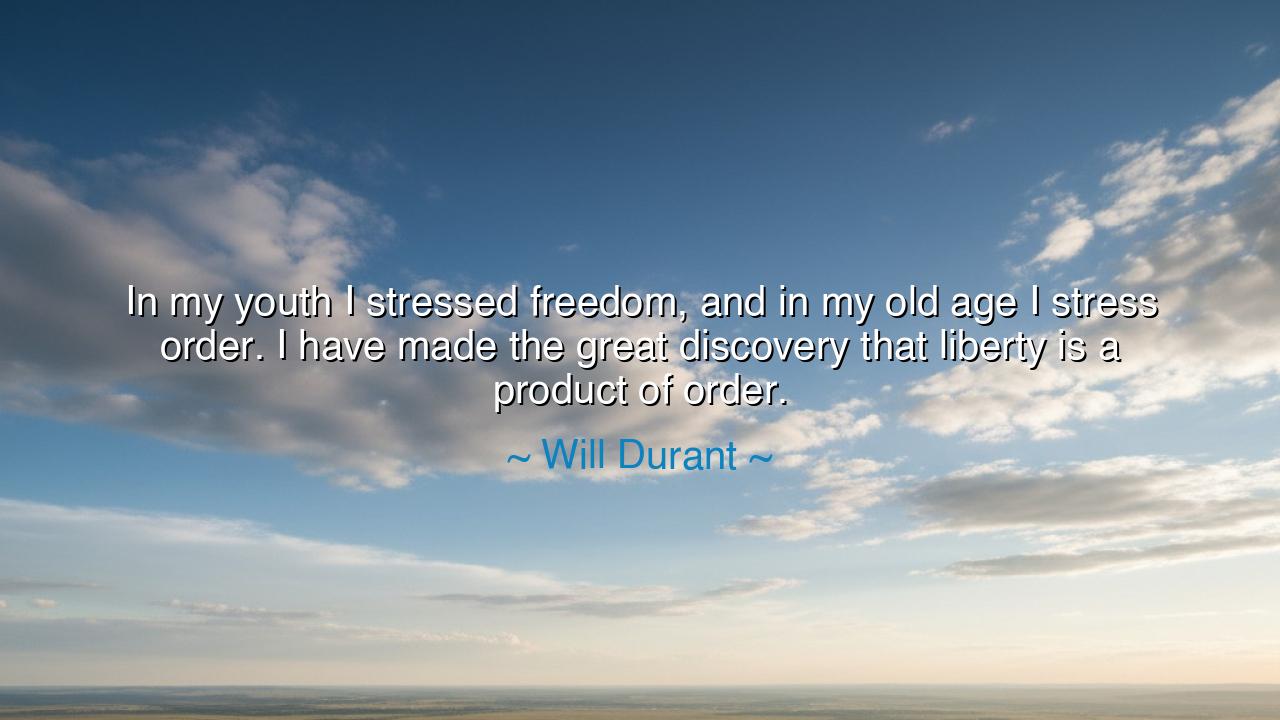
In my youth I stressed freedom, and in my old age I stress order.
In my youth I stressed freedom, and in my old age I stress order. I have made the great discovery that liberty is a product of order.






“In my youth I stressed freedom, and in my old age I stress order. I have made the great discovery that liberty is a product of order.”
Thus spoke Will Durant, the philosopher and historian whose words carried the weight of civilizations. Having studied the rise and fall of empires, the flowering of thought, and the long, slow evolution of humankind, Durant came to this revelation not through idle reflection, but through the vast observation of history itself. His insight is not a contradiction—it is the reconciliation of two truths that only the wise understand: that freedom is not born from chaos, but from order; that liberty, to endure, must be supported by discipline, structure, and law.
In the fiery dawn of youth, it is freedom that stirs the blood. The young soul longs to cast off every chain, to rebel against boundaries, to fly ungoverned beneath the open sky. Such passion is noble, for it gives birth to revolutions, to art, to change. Yet, as Durant learned through the long contemplation of human destiny, freedom without order dissolves into disorder, and disorder soon devours freedom itself. For when chaos reigns, the strong dominate the weak, and liberty becomes the privilege of the few. Only in a just and balanced order—where laws protect and citizens respect—can true liberty live and grow.
History provides its proof. When the Roman Republic fell into the anarchy of ambition and civil war, the people, weary of strife, surrendered their liberty to Caesar in exchange for peace. And when the French Revolution, born in the name of freedom, descended into blood and terror, the world saw once again how unrestrained liberty can destroy itself. Out of chaos rose Napoleon, who offered the order of empire in place of the freedom of men. Thus, Durant’s wisdom is not a rejection of liberty, but a warning: without the foundation of order, freedom will collapse into tyranny or ruin.
In his youth, Durant saw the world through the lens of the spirit—he believed that freedom was the highest of all virtues. But as he grew older and witnessed the patterns of history repeating, he discerned that the flame of liberty burns brightest only when contained within the lantern of order. The balance of the two—freedom and discipline—is what gives civilization its strength. Like music, which is not mere noise but harmony governed by rhythm, so too is a free society only possible when guided by rules that preserve peace.
Think of the founding of the United States, born of rebellion yet bound by law. The framers of the Constitution, men who had tasted tyranny and chaos alike, understood what Durant later put into words: liberty cannot survive without structure. They built a system of checks and balances—a deliberate order—so that freedom might endure beyond the passions of a single generation. Their wisdom mirrors Durant’s discovery: that true freedom is not doing whatever one pleases, but living in a society where each man’s liberty is protected by the justice that binds them all.
There is also a deeper, personal meaning in Durant’s reflection. Within the individual soul, freedom and order must coexist as well. The undisciplined man may chase pleasure, but he becomes enslaved by his desires. The disciplined man, who imposes order upon his life—through purpose, self-control, and reflection—discovers the greatest liberty of all: mastery of himself. As the ancients taught, “He who conquers others is strong, but he who conquers himself is mighty.” Thus, the philosopher’s words apply not only to nations, but to every living heart.
So, children of the restless age, heed this ancient truth: freedom and order are not enemies, but partners in the dance of civilization. Cherish freedom, but build the order that will sustain it. Seek liberty, but guard it with discipline and justice. For chaos promises delight but delivers ruin, while order, when shaped by wisdom and mercy, gives rise to harmony.
Practical teaching: Begin with yourself. Govern your own passions before you seek to reform the world. Create order in your days—through purpose, through patience, through self-restraint—and you will find a deeper freedom than rebellion can give. In your communities, honor both law and compassion; defend liberty, but do not forsake the structure that protects it. For as Will Durant discovered after a lifetime of study, the secret of a lasting civilization—and a fulfilled soul—is this: true liberty is born not from defiance, but from order guided by wisdom.






AAdministratorAdministrator
Welcome, honored guests. Please leave a comment, we will respond soon